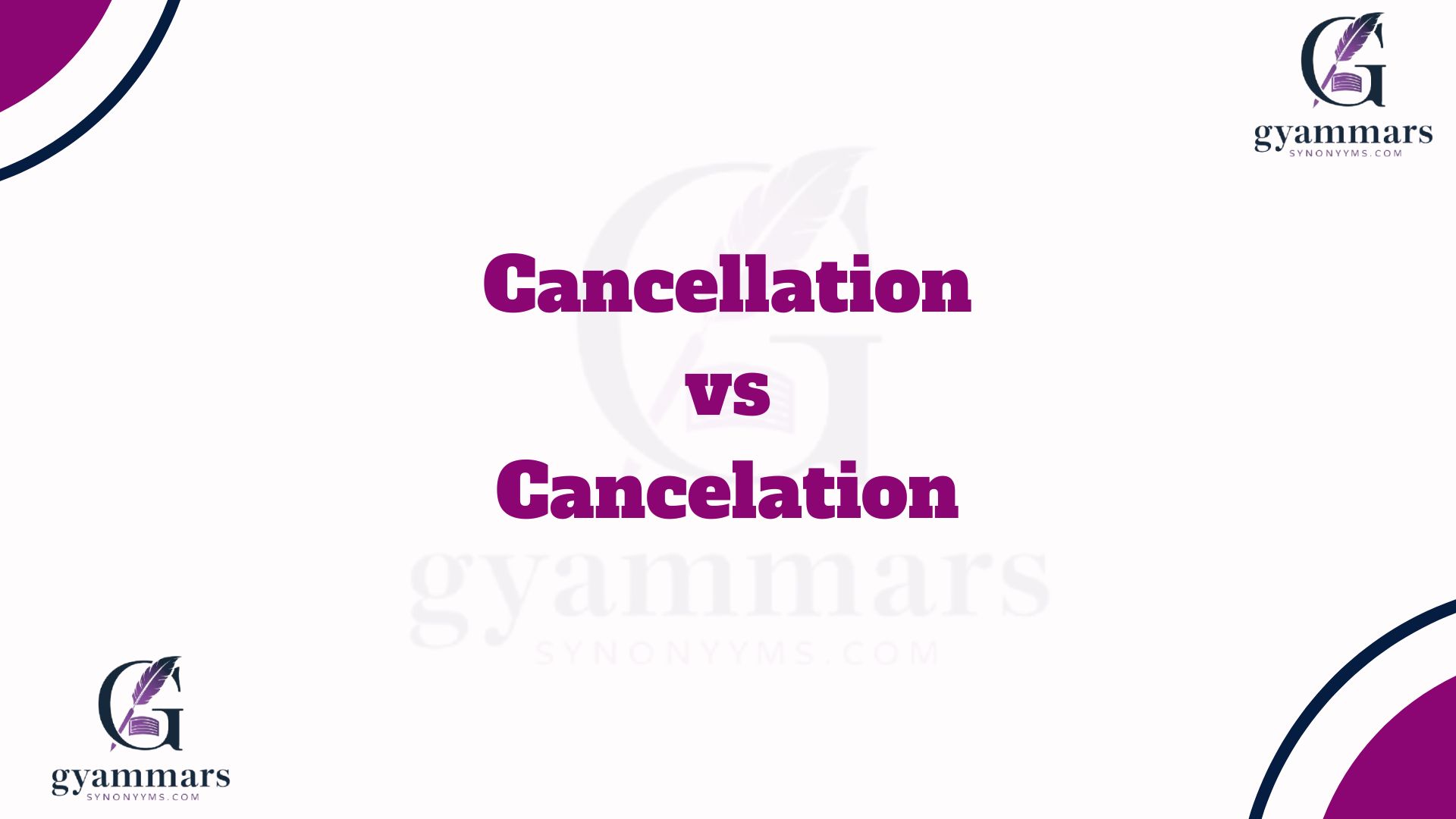If you’ve ever typed out an email or written an article and hesitated when you got to the word cancellation, you’re not alone. The difference between cancellation and cancelation often causes confusion. Which spelling is correct? And when should you use each?
This seemingly minor issue can have significant implications in professional writing, as it’s essential to use proper spelling, grammar, and language conventions. So, if you’re tired of wondering which one to pick and want to get it right every time, you’re in the right place!
In this post, we’ll explore the spelling differences between cancellation and cancelation, uncover their linguistic roots, and explain when and why you should use each one. We’ll also tackle the regional preferences and offer useful tips to avoid common mistakes. By the end of this guide, you’ll have a clear understanding of both terms and how to use them like a pro.
What’s the Difference Between “Cancellation” and “Cancelation”?
It’s a common misconception that both words are interchangeable. However, there are important distinctions between cancellation and cancelation. While they’re both variations of the same root word, spelling preferences can vary depending on your region and the style guide you follow.
“Cancellation” (With Two L’s):
- Standard and Widely Accepted: The double “L” spelling, cancellation, is the more common and preferred form of the word. It’s used across American English, British English, and Australian English.
- Example in Use: “The cancellation of the event took place last minute due to weather conditions.”
- This spelling has a long-standing presence in dictionaries and publications, and it’s typically regarded as more polished and professional.
“Cancelation” (With One L):
- A Rare Alternative: While it’s not outright wrong, cancelation is seen as a less standard spelling. It’s a variation that tends to show up in more informal contexts, but even in those, cancellation remains dominant.
- Example in Use: “He submitted the cancelation form after the flight was delayed.”
- Less Common: This variant is primarily used in American English but is far less prevalent than cancellation. It is, however, sometimes found in older or less formal writing.
Historical and Linguistic Origins
Understanding the history and linguistic origins of both spellings can help clarify why one is favored over the other and why they evolved differently.
Etymology of “Cancellation”:
- Rooted in Latin: The word cancellation traces back to the Latin word “cancellatio”, meaning “crossing out” or “rejection.” The Latin root conveys the concept of removal or invalidation.
- Early English Use: Cancellation appeared in English as early as the 16th century, adhering to the Latin spelling conventions. The double L spelling became entrenched as the correct form over time.
- Persistent Popularity: As English evolved, cancellation continued to be the standard spelling in both British and American English.
Etymology of “Cancelation”:
- Influenced by Other Words: The single L form, cancelation, likely arose due to the influence of other words ending in -ation (e.g., expectation, explanation, location). In these words, the -ation ending does not require a double L, leading some to mistakenly apply the same logic to cancel.
- American Spelling Reforms: During the 19th century, American English saw a move toward simplifying spellings (such as eliminating extra letters in words like traveling instead of travelling). This led to cancelation being more widely used in informal American contexts.
- Non-Standard in Dictionaries: Despite its occasional use, cancelation is rarely found in reputable dictionaries. Leading language authorities like Merriam-Webster and the Oxford English Dictionary list cancellation as the preferred term.
Which Spelling Should You Use?
When faced with the choice between cancellation and cancelation, the rule is simple: choose “cancellation.” It’s the correct spelling in virtually every context. Here’s why:
General Consensus:
- Mainstream Dictionaries: Reputable dictionaries such as Merriam-Webster, Oxford, and Collins all list cancellation as the primary spelling.
- Formal and Informal Writing: Whether you’re writing a formal report, a business email, or a creative article, cancellation will always be the safest and most professional option.
- Avoid Confusion: Using cancelation could confuse readers or appear incorrect, especially in professional and academic contexts. You’re more likely to be taken seriously when you stick with the well-established version of the word.
When “Cancelation” Might Slip In:
- Occasional Use in American Informal Contexts: While cancelation occasionally shows up in more informal settings in American writing, it remains a rare exception.
- Stylistic Choices: Some writers may opt for cancelation as a stylistic choice, possibly to simplify the spelling or follow their personal writing preferences. However, this is not recommended in formal settings.
The Regional Divide: How American and British English Differ
The spelling difference between cancellation and cancelation is particularly evident when considering the regional variations between American and British English.
In American English:
- Dominant Usage: In the United States, cancellation is the overwhelmingly preferred spelling. Even though some may still use cancelation (especially in older or more informal works), this variant remains non-standard and outdated.
- Dictionaries and Style Guides: Major U.S. style guides like The Chicago Manual of Style and Merriam-Webster both emphasize cancellation as the correct spelling.
- Example: Official U.S. airline or travel policies, government documents, and even casual communications will almost always feature cancellation.
In British English:
- Exclusively “Cancellation”: In the UK, cancelation is almost never used, with cancellation being the only accepted form.
- Authority of British Guides: Sources like Cambridge Dictionary and Collins English Dictionary exclusively list cancellation, ensuring no confusion for British English users.
- Example: If you book a ticket for a flight in the UK, you will see cancellation in the terms and conditions.
In Other Regions:
- Australian and Canadian English: Both follow the British model and use cancellation exclusively, making it the preferred form across much of the English-speaking world.
- International Consistency: If you’re working on an international project, sticking to cancellation ensures consistency and avoids potential confusion among a diverse audience.
Common Mistakes and How to Avoid Them
Many people make mistakes when it comes to using cancellation and cancelation, but don’t worry—these mistakes are easy to avoid. Here are the most common errors:
Mistake #1: Confusing Spelling with Similar Words
- Why It Happens: Many people mistakenly use cancelation because they assume it follows the same pattern as words like expectation, location, or salvation, which all drop the double letter in the -ation suffix.
- Tip: Remember, cancel is an exception to this pattern, so don’t apply the same rule here. Always use cancellation.
Mistake #2: Mixing Regional Preferences
- Why It Happens: If you’re writing for an international audience, the American spelling of “cancelation” might slip in, especially if you’re used to casual American style.
- Tip: Always check your writing context—professional and academic writing should always use cancellation.
Mistake #3: Overcomplicating Spelling Choices
- Why It Happens: Sometimes writers get caught up in the etymology or historical use of a word and try to find more complicated alternatives.
- Tip: Stick with the simplest, most widely accepted form—cancellation—and avoid unnecessary confusion.
Practical Tips for Remembering Which Spelling to Use
Now that we’ve covered the rules and common mistakes, here are some tips to help you remember when to use cancellation vs. cancelation:
Use Mnemonics to Help You Remember:
- The Double L Trick: When in doubt, remember that cancellation has two L’s—just like the word call or install. This visual cue can help you make the right choice.
- Association with Removal: You can also associate the double L with the idea of “removing” or “canceling” something—as if the extra letter is a symbol of finality.
Always Consult a Dictionary:
- If you’re uncertain, you can easily confirm the correct spelling by checking a trusted dictionary like Merriam-Webster or Oxford English Dictionary. They will always favor cancellation.
In Formal Writing, Stick to “Cancellation”:
- Err on the Side of Caution: If you’re writing professionally or academically, it’s best to use cancellation consistently. It avoids mistakes and shows your attention to detail.
Conclusion: Choose Clarity, Choose “Cancellation”
In a world where written communication matters more than ever, the spelling of a single word can subtly impact how people perceive your message. Between cancellation and cancelation, the verdict is clear:
Use “cancellation”—it’s the correct, preferred, and professional spelling recognized in both American and British English.
Words carry weight. Whether you’re sending an email, writing a blog, submitting an academic paper, or crafting business content, using the right form reflects your attention to detail, language knowledge, and overall credibility.
And while cancelation may pop up now and then, it lacks the widespread approval and consistency that cancellation enjoys. If you’re aiming for accuracy, trust, and fluency in your writing—stick with the double L.
FAQs: Frequently Asked Questions
Q1: Is “cancelation” ever considered correct?
Technically, cancelation is a variant spelling, but it’s not standard and rarely accepted in formal contexts. Most authoritative sources—like Merriam-Webster and Oxford—list “cancellation” as the correct form. So while it might not be wrong in casual writing, it’s still better to avoid it.
Q2: Why do some people use “cancelation” if it’s less common?
The spelling cancelation emerged from an effort to simplify English in America during the 19th century. Some writers mistakenly applied the single-L pattern seen in words like location or explanation. But over time, cancellation remained the dominant and preferred spelling, even in the U.S.
Q3: What spelling should I use in academic or business writing?
Always use cancellation. It’s the spelling recognized by all major dictionaries, style guides, and grammar authorities. Using cancelation in formal settings can appear unprofessional or incorrect.
Q4: Is there a difference in meaning between “cancellation” and “cancelation”?
No, both words mean the same thing—the act of calling something off or making it void. The only difference lies in their spelling and acceptance. Cancellation is the version that aligns with accepted language standards.
Q5: Do British and American English both use “cancellation”?
Yes. Both British and American English prefer cancellation. While cancelation may occasionally appear in informal American writing, it’s still considered a non-standard variant.

“Emma Brooke at Grammar Synonyms is your trusted source for mastering the art of language. Whether you’re looking for the perfect synonym, refining your grammar, or searching for that one ideal phrase, we’ve got you covered. With a wealth of tools and resources, Emma Brooke brings you creative solutions for all your writing needs, making sure your words always hit the mark. Unlock a world of language possibilities and elevate your writing with ease.”












